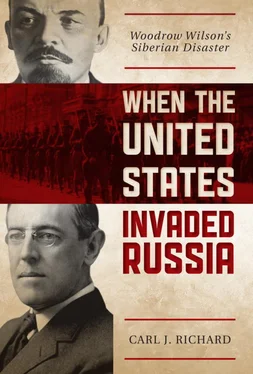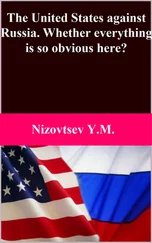Once again, the president’s attitude was clear. Wilson abided by the State Department’s decision not to publish the documents until September 15, 1918, soon after the landing of American forces in Siberia, a time when Wilson needed to deflate the critics of his Russian policy. The documents were published in pamphlet form by the Committee on Public Information. The originals were not shown to the press, but historian Samuel Harper was called in to verify their authenticity. Harper, who concluded that there was no reason to doubt their authenticity, later implied in his memoirs that he had been pressured to so conclude. [14] Kennan, “Sisson Documents,” 131–32.
Wilson rebuffed requests by State Department officials that he turn over the Sisson Documents to them for analysis, saying that “he did not have time to lay hands on documents.” In 1921, when Wilson left office, the new White House secretary found no trace of them. They were discovered in a White House safe in December 1952, and further evidence has revealed them to be forgeries. [15] Ibid., 133; Link, Papers of Woodrow Wilson , Joseph P. Tumulty to Edith Wilson, March 26, 1920, vol. 65, 134–35.
The evidence available in 1918 was more than sufficient to cast deep suspicion on the authenticity of the Sisson Documents. The actions of the State Department and President Wilson reveal clearly that the documents, like the war prisoner rumors, were not considered a genuine cause for concern. Having made a reluctant decision to intervene in Siberia on other grounds, Wilson was determined to use all of the weapons at his disposal to place his critics on the defensive.
The second intervention theory, first advanced by John Albert White and later supported by Betty M. Unterberger, maintains that Wilson decided to intervene in Siberia in order to prevent the Japanese from invading the region unilaterally and exerting sole control over it. This theory holds that as the summer of 1918 approached, it became obvious to Wilson that the Japanese were prepared to invade Siberia. This realization led Wilson to support Allied action because he reasoned that if the Japanese invaded Siberia alone, it would be much more difficult to force them to withdraw at a later time than if they invaded as part of an Allied force understood to be invading and withdrawing in unison. Unterberger added that Wilson considered a unilateral Japanese invasion of Siberia particularly dangerous because it might threaten free trade in China. [16] John Albert White, The Siberian Intervention (Princeton, N.J.: Princeton University Press, 1950), 261–62; Betty M. Unterberger, America’s Siberian Expedition, 1918–1920 (Durham, N.C.: Duke University Press, 1956; reprint, New York: Greenwood, 1969), 87–88. See also Betty M. Unterberger, The United States, Revolutionary Russia, and the Rise of Czechoslovakia , 2nd ed. (College Station: Texas A & M University Press, 2000), 263–64.
White and Unterberger used different methods to deal with the lack of documentation supporting their theory. White’s method was to imply that American diplomats of the day did not write about their suspicions concerning the Japanese because they feared offending Japan, a nation officially allied with the United States in World War I. The problem with this hypothesis is that it does not explain why American diplomats did not write secretly to one another concerning these suspicions if they were powerful enough to necessitate sending an American army to Siberia. By contrast, Unterberger’s method was to cite the suspicions that Wilson expressed concerning the Japanese after he had decided to intervene. But Wilson’s suspicions of the Japanese in August 1918, suspicions created by their actions in that month, cannot be used to explain his decision to intervene in July. Wilson would have been foolish not to be suspicious of the Japanese after they began dispatching to Siberia numbers of troops vastly exceeding the 12,000 they initially agreed to send. [17] White, Siberian Intervention , 262; Unterberger, America’s Siberian Expedition , 84. It is true that Wilson was briefly suspicious of the Japanese in January 1918 when they rather tactlessly informed U.S. Ambassador Roland Morris that they wished to be left alone to handle any emergencies in Siberia, but the strongly worded messages Wilson ordered in reply silenced the Japanese. See Link, Papers of Woodrow Wilson , Wilson to Robert Lansing, January 20, 1918, vol. 46, 46–47; Wilson to Frank L. Polk, January 28, 1918, vol. 46, 117–18. Unterberger’s assertion that Wilson was pushed into intervention when, in May 1918, he learned that the Japanese were prepared to invade Siberia with Chinese approval is also fallacious. The State Department had learned of Japanese-Chinese cooperation from the Chinese themselves as early as February and was far from frantic about it. See U.S. Department of State, Foreign Relations, Russia, 1918 , Paul S. Reinsch to Robert Lansing, February 23, vol. 2, 55; Robert Lansing to Walter Hines Page, February 27, vol. 2, 58. For the Japanese agreement to send only 12,000 soldiers to Siberia as late as August 3, see Link, Papers of Woodrow Wilson , Frank L. Polk to Woodrow Wilson, August 3, 1918, vol. 49, 175.
Although some American policymakers were indeed suspicious of Japan before August 1918, Japan was hardly the United States’ only trade rival in the Far East, and Wilson was no more suspicious of the Japanese than he was of the British and French. In fact, the first report to the State Department sent by Ambassador Francis from Russia on May 2, 1916, blamed the British for the sudden decision of the czarist government not to sign a commercial treaty with the United States. British Prime Minister David Lloyd George wrote in his memoirs that Wilson was apprehensive about intervening in Russia partly because he feared that the British desired to replace the Soviet Government with a friendly czarist regime. Indeed, by January 3, 1918, Wilson had received a report claiming that a British military attaché in Russia, Lieutenant Colonel Alfred Knox, had actually worked to oust the Provisional Government in the hope of obtaining a stronger government in Russia. On May 28, Wilson read a report by the U.S. representative to the Supreme War Council, General Tasker H. Bliss, that stated regarding the proposed Siberian intervention, “I distrust everything I hear on this subject here…. [The British and French] would like to see something like the old regime restored.” Bliss’s remark must have struck a nerve because Wilson replied to his war council representative the same day through U.S. Chief of Staff Peyton C. March that the Allies “should not have as their ultimate object any restoration of the ancient regime.” [18] U.S. Department of State, Lansing Papers, 1914–1920 , David R. Francis to Lansing, May 2, 1916, vol. 2, 310–12; David Lloyd George, War Memoirs of David Lloyd George (Boston: Little, Brown, 1935–1937), vol. 6, 171; Link, Papers of Woodrow Wilson , William Boyce Thompson Memo, January 3, 1918, vol. 45, 444; Newton D. Baker to Wilson, May 28, 1918, vol. 48, 181; Peyton C. March to Tasker H. Bliss, May 28, 1918, vol. 48, 182.
Nor had the Bolshevik publication of the secret treaties concocted by the British and French, treaties that divided the spoils of war while the war was still in progress, lessened Wilson’s suspicion of them. Indeed, it is largely due to these revelations that Wilson stressed the need for “open covenants” in his Fourteen Points Speech. Also, it was not the Japanese, but the British and French, who were constantly pressuring Wilson to agree to Japanese intervention. [19] Seymour, Intimate Papers of Colonel House , vol. 3, 323–24.
Читать дальше












